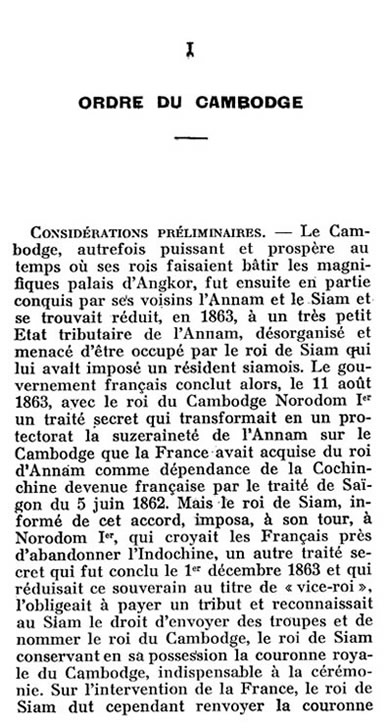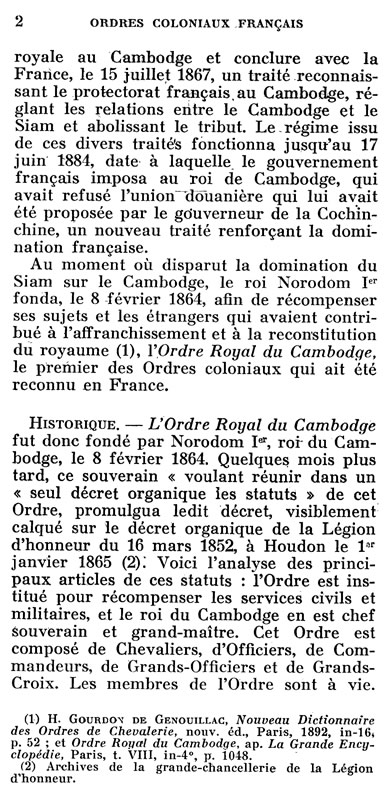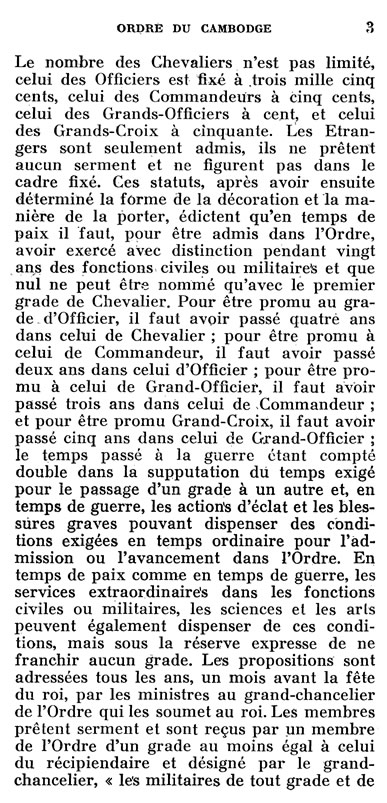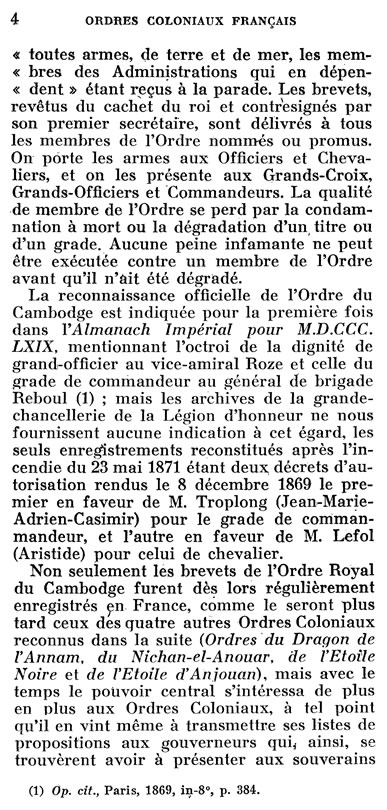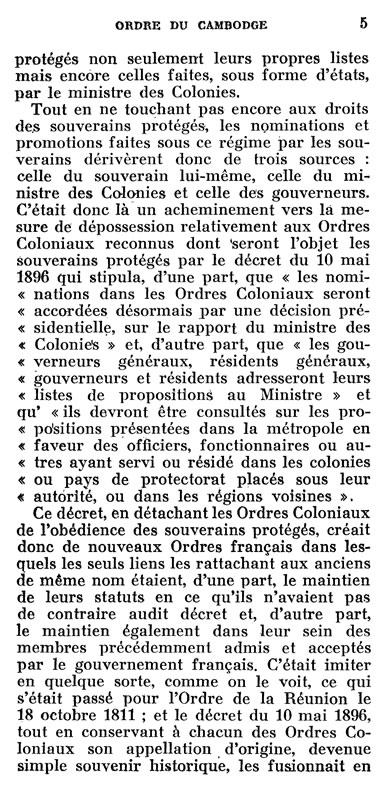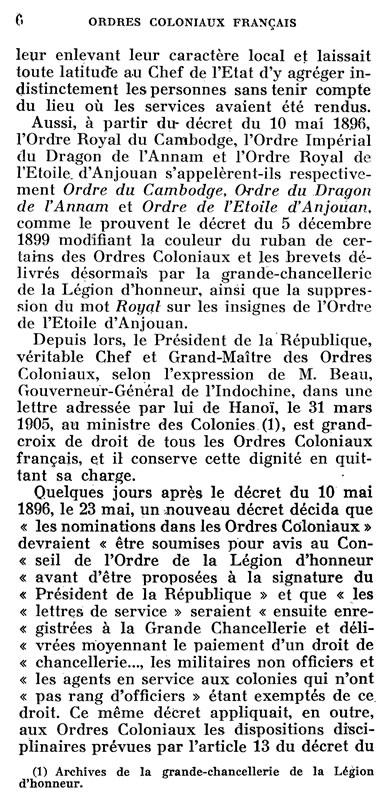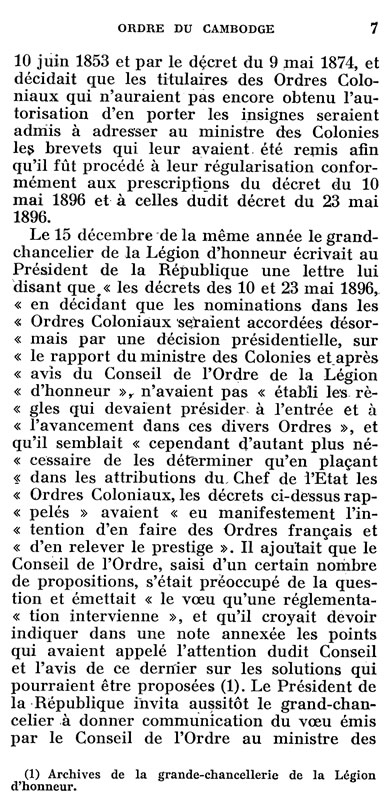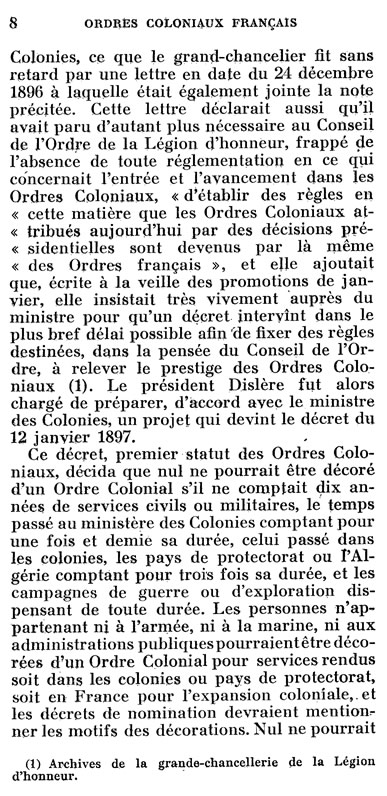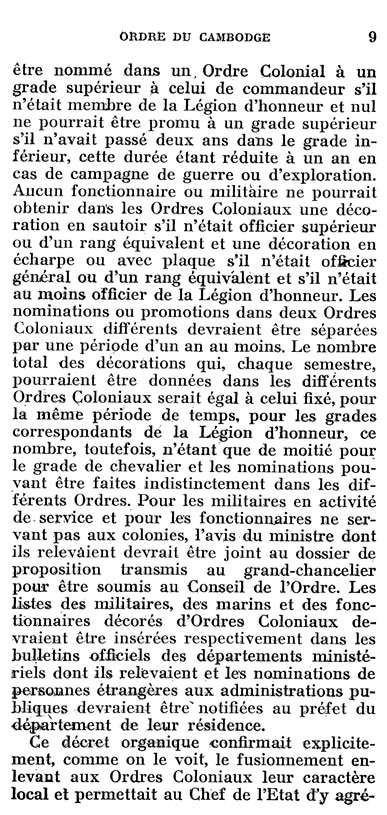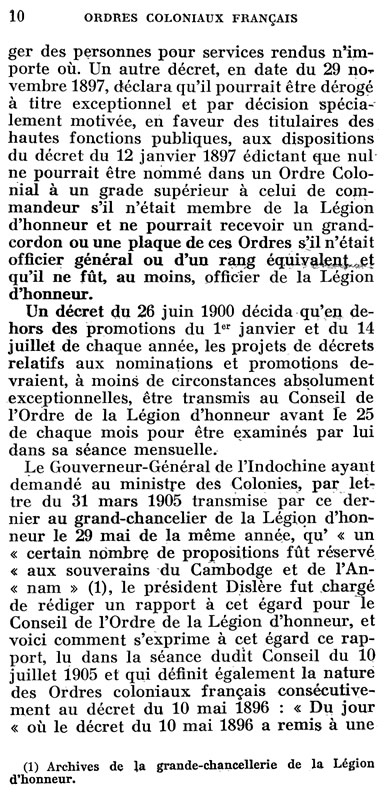CM2 - National Order of Independence
CM4 - Royal Order of Sahametrei
CM7 - Medal of National Defense
CM11 - Medal of Sisowath Monivong
CM12 - Medal of Norodom Sihanouk
CM13 - Medal of Norodom Suramarit
CM15 - Royal Order of Sowathara
CM16 - Royal Order of Moniseraphon
CM17 - Anussara Medal of Royal Remembrance
CM18 - Khemar Patekar Medal of Cambodian Recognition
CM20 - Khemara Kelarith Sports Medal
CM21 - Medal of Immaculateness
CM22 - Satrei Vathan Medal of Feminine Merit
CM23 - Royal Order of Industrial Merit
CM24 - Roayl Order of Labor Merit
CM27 - Order of Outstanding Service to the State
CM28 - Medal for the Royal Crusade for Independence
CM29 - Medal of People's Socialist Community
CM30 - Medal of Preah Vesandar
THIS PAGE UNDER CONSTRUCTION
References:
1. Le Bailli Comte Michel de Pierredon, Les Ordres Coloniaux Français, 1926, pp 1-20, chapter "Ordre du Cambodge".
| Française | English |
|
|
I
PRELIMINARY CONSIDERATIONS. — Cambodia, once powerful and prosperous in the time when the kings were building the magnificent palaces of Angkor, was then partly conquered by its neighbors Annam and Siam, and was reduced in 1863 to a very small tributary state of Annam, disorganized and threatened to be occupied by the King of Siam, who had imposed a resident Siamese. The French government then concluded, on August 11, 1863, with the King of Cambodia Norodom I, a secret treaty that turned into a protectorate of Annam, suzerainty over Cambodia that France had acquired, the King of Annam as a dependency of Cochinchina, which became French by the Treaty of Saigon on 5 June 1862. But the King of Siam, informed of this agreement, imposed, in turn, to Norodom I, who believed the French about to abandon Indochina, another secret treaty which was concluded on 1 December 1863 and reduced the sovereign to the title of "viceroy" required him to pay tribute and recognize the right of Siamese troops and to appoint the King of Cambodia, the King of Siam retaining possession of the royal crown Cambodia essential for the ceremony. On the intervention of France, the King of Siam had yet to return the crown of |
|
|
Kingdom of Cambodia and concluded with France, on July 15, 1867, a treaty recognizing the French Protectorate in Cambodia, governing relations between Cambodia and Siam and abolishing the tribute. The regime that emerged from these various treaties functioned until June 17, 1884, when the French government imposed to the King of Cambodia, who had refused the customs union which had been proposed by the Governor of Cochinchina, a new treaty strengthening French domination. HISTORY. - The Royal Order of Cambodia was therefore founded by Norodom I, King of Cambodia, on February 8, 1864. A few months later, the sovereign "in wanting to gather a "single organic decree of the statutes" of the Order, promulgated the decree, obviously modeled on the organic decree of the Legion of Honour on 16 March 1852, at Houdon on 1 January 1865 (2): Here is the analysis of the main articles of the statutes: the Order is established to reward civil and military service, and the king of Cambodia is the sovereign Head and grand Master. This Order is composed of Knights, Officers, Commanders, Grand Officers and the Grand - Cross. Members of the Order are to be living. ________________________________________ |
|
|
The number of Knights is not limited, that of the Officers is fixed at three thousand five hundred, that of the Commanders at five hundred, that of the Grand Officers at one hundred, and that of the Grand Cross at fifty. Foreigners are only allowed admission, they do not give any oath and are not included in the fixed cadre These statutes after having then determined the shape of the decoration and how to wear it, enact in peacetime that it is necessary for admission into the Order, having exercised with distinction for twenty years of civilian or military services and that no person may be appointed other than with the first grade of Knight. To be promoted to the grade of officer, one must have spent four years in that of Knight ; to be promoted to that of Commander , one must have spent two years in that of Officer; to be promoted to that of Grand Officer, one must have spent three years in that of Commander ; and to be promoted to Grand Cross, one must have spent five years in that of Grand Officer ; the time spent in war being counted double in the computation of the time required for the passage from one grade to another, and in time of war, deeds of valor and serious injury may exempt the conditions required in the ordinary course for admission or advancement in the Order. In times of peace as in time of war, extraordinary service in civilian or military services, science and the arts can also exempt these conditions, but subject to the express condition of not passing a grade. Proposals are sent every year, a month before the festival of the king, the ministers in the Grand Chancellor of the Order submit them to the King. Members take an oath and are received by a member of the Order of a grade at least equal to that of the recipient designated by the Lord Chancellor, "the soldiers of all ranks and |
|
|
all arms, land and sea, members of the Administration that depend on" being received in the parade. The brevets, with the stamp of the King and countersigned by his first secretary, are issued to all members of the Order appointed or promoted. It bears the arms of Officers and Knights, and it present them to the Grand Cross, Grand Officers and Commanders. Membership of the Order is lost through the death penalty or degradation of one title or a grade. Any ignominious punishment can not be enforced against a member of the Order before he has been degraded. (1) Op cit., Paris, 1869, 8vo, p. 384. |
|
|
protection not only their own lists but those made in the form of reports from the Minister of the Colonies. |
|
|
depriving them of their local character and left to the discretion of the Head of State to aggregate people indiscriminately regardless of where the services were rendered. (1) Archives of the Grand Chancellor of the Legion of Honor. |
|
|
10 June 1853 and by the decree of 9 May 1874, and decided that the holders of Colonial Orders which have not yet been authorized to wear the insignia would be allowed to submit to the Minister of Colonies brevets that had been given in order that he might regularize their process in accordance with the requirements of the Decree of 10 May 1896 and those of the Decree of 23 May 1896. (1) Archives of the Grand Chancellor of the Legion of Honor. |
|
|
|
|
|
|
|
|
|
| page 11 |
|
